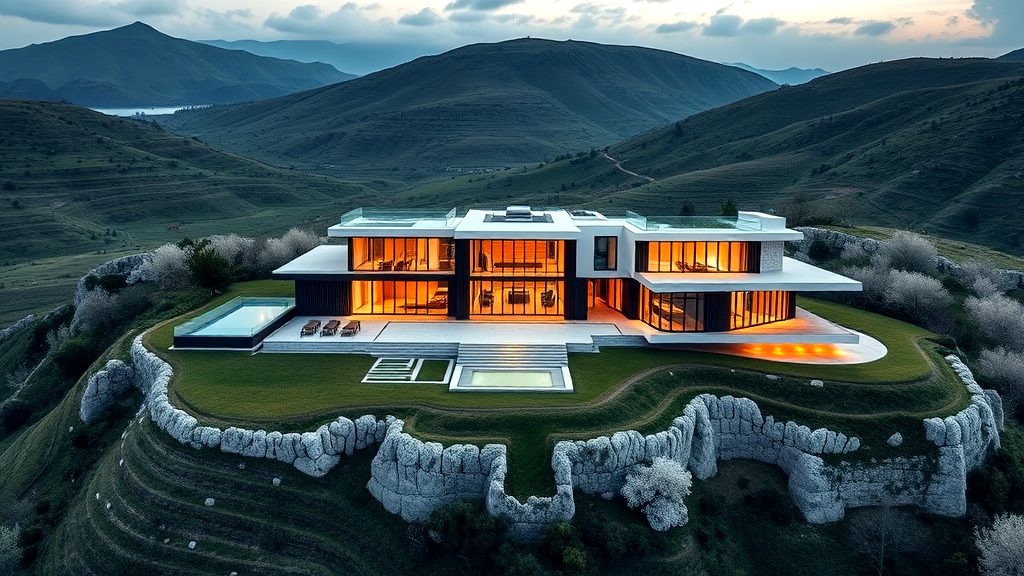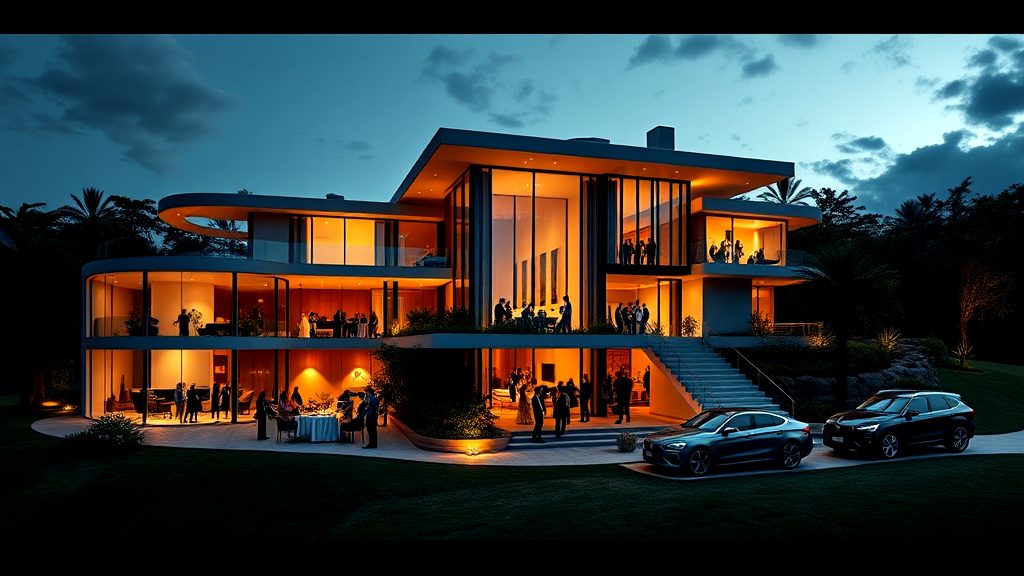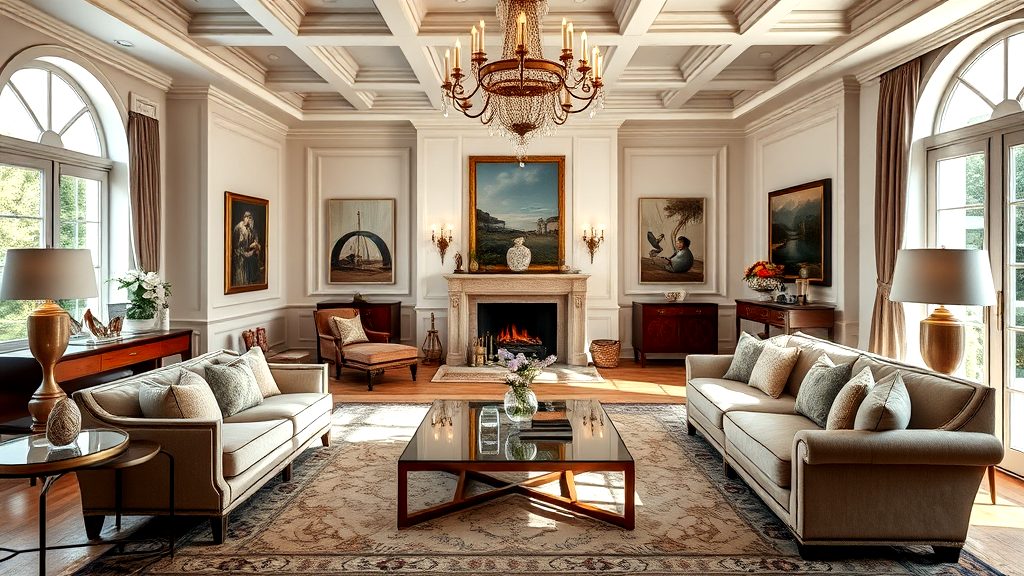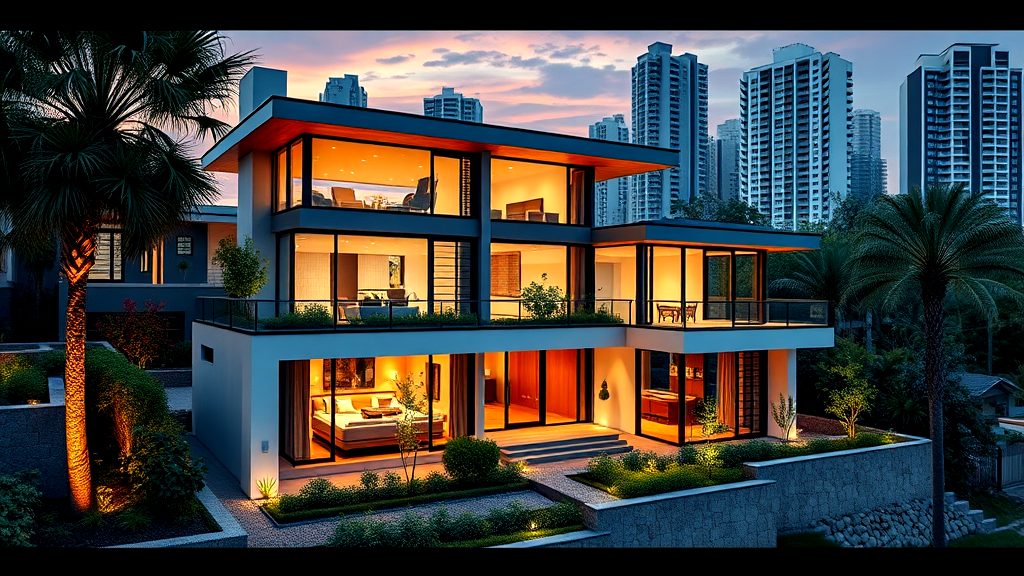Current Trends in Luxury Homes Market
In the world of luxury real estate, staying on top of trends is key. High-end buyers crave unique homes with a touch of prestige. They want more than a house; they’re after a legacy. To succeed, real estate agents must craft captivating stories about each property.
The real estate market is shifting. Buyers now prefer larger homes with wellness amenities. Think “well kitchens” and organic dining options. Luxury agents must adapt and strategize accordingly.
Marketing to luxury clients involves a deep understanding of their lifestyle. Agents can thrive by tailoring their approach. These estate marketing tips help build trust and make a lasting impression. Embrace change and shine as a luxury listing specialist.
Key Takeaways
-
Luxury real estate thrives on exclusivity and prestige. Buyers want more than just homes; they desire unique experiences and legacies.
-
Real estate agents must adapt to economic shifts and buyer preferences. Larger homes with wellness features are now in demand.
-
Luxury agents should highlight smart home and eco-friendly features to attract buyers.
-
Crafting real estate marketing stories around unique property features engages high-net-worth buyers.
-
Building strong relationships and understanding luxury clients‘ lifestyles is crucial for success.
Understanding the Luxury Real Estate Market
Understanding the dynamics of the luxury homes market hinges on exclusivity and emotion. High-net-worth buyers are searching for legacies, not just houses. Successful luxury listing specialists weave narratives that resonate, focusing on unique experiences and properties. Economic factors, such as low-interest rates, drive demand for larger homes with wellness amenities. Global events have shifted preferences toward more spacious, remote areas. Smart home technology and sustainability are now key in luxury real estate. Crafting immersive estate marketing tips with digital storytelling is crucial. A real estate agent’s role involves building strong relationships with discerning buyers.

Key Factors Driving Luxury Home Demand
Examining the driving forces behind luxury home demand reveals fascinating insights. Economic factors, like low interest rates, make upscale properties attractive to affluent buyers. Global events have nudged preferences towards larger spaces with wellness amenities. Personalization and unique experiences in design further amplify this demand. This shift in the luxury real estate narrative is shaping a new market era. Sustainability and smart home features are now more than trends; they’re necessities. To stay competitive, real estate marketing strategies must adapt, focusing on the affluent’s evolving tastes. For those intrigued by local trends, Real Estate North Tahoe offers insights.
Economic Influences on Luxury Real Estate
When eyeballing the luxury homes market, economic conditions play a major role. High-net-worth buyers react to shifts like low-interest rates or favorable tax laws. In times of economic growth, buyers often splurge on expansive properties with all the trimmings. In contrast, during downturns, they may become more conservative. A savvy luxury listing specialist keeps a finger on the pulse of these changes. They adapt, ensuring that clients are always a step—or a luxury home—ahead. Embracing trends, these specialists craft estate marketing tips that resonate amidst evolving financial climates.
The Impact of Global Events on High-End Properties
Examining how global events shape high-end properties highlights a fascinating shift. The luxury homes market has witnessed a surge in demand for larger residences in tax-friendly zones like Florida. This shift reflects buyers’ new preferences for space and wellness features. Pandemic-induced changes have driven this trend from bustling urban areas to more serene locales. Smart home technology and eco-friendly elements are no longer optional; they are essential. A skilled luxury listing specialist adapts to these trends, crafting compelling narratives and strategies tailored to ever-changing buyer desires.
Modern Architecture and Design Trends
In the luxury homes market, modern styles are embracing technology and sustainability. Think sleek designs with smart home systems and eco-friendly features. Buyers crave homes that offer both personal touches and cutting-edge amenities. It’s about creating spaces that feel exclusive yet inviting. These trends resonate with the affluent, seeking more than just a house. They want experiences. Design is now about blending the best of innovation with personal comfort. To capture this market, a luxury listing specialist must highlight these aspects, making each property uniquely appealing.
Incorporating Smart Home Technology
Integrating smart home technology into the luxury homes market is like adding a cherry on top of an already exquisite sundae. Buyers now expect homes to be smart, secure, and convenient. From voice-controlled lighting to app-managed security systems, these features are non-negotiable for the tech-savvy elite. Highlighting these elements in real estate marketing can entice luxury clients who crave seamless integration of modern comforts. A savvy real estate agent knows how to spin the tale, showcasing smart features as the pièce de résistance in high-end homes.
Sustainable and Eco-Friendly Features in Luxury Homes
Highlighting eco-friendly touches, luxury homes are becoming green havens that charm buyers. Solar panels glisten under the sun, powering homes with renewable energy. Water-saving systems reduce waste, while efficient insulation keeps temperatures just right. Buyers love how these features cut bills and help the planet. In the luxury homes market, these sustainable elements are more than a bonus; they’re expected. Smart gardens with native plants add beauty and require little water. Such features engage luxury clients, making them eager to invest in a greener future.
Marketing Strategies for Luxury Real Estate
In the domain of marketing luxury properties, understanding client lifestyles is key. Develop immersive experiences around properties. Digital storytelling adds depth; professional photography enhances allure. Establish partnerships with brands that share the same luxury ethos. This creates a cohesive image that resonates with potential buyers. Utilize exclusive events to showcase properties, allowing clients to experience them firsthand. Engage with influential figures to amplify reach and visibility. Integrate smart home technology and eco-friendly features as a standard. Finally, engage with potential buyers on dedicated luxury social media channels.

Building a High-End Client Profile
Crafting a high-end client profile starts with grasping their world. Understanding luxury real estate demands insights into buyer preferences, from wellness amenities to smart home technology. This isn’t just about homes, but about lifestyles and legacies. Engage with clients through real estate marketing that speaks their language and resonates with their desires. As a savvy real estate agent, dive deep into their passions, ensuring your approach mirrors their unique experiences. It’s about connecting with aspirations and delivering unmatched excellence, making every interaction meaningful and memorable—just like their dream home.
Effective Use of Digital Storytelling
Crafting narratives in the luxury homes market means spotlighting unique property features. Imagine telling a tale of an elegant mansion with a rooftop garden. Use professional photos and videos to capture every detail. This isn’t just about selling a house; it’s about selling a lifestyle. Connect with buyers emotionally. Use rich visuals and compelling stories. It’s like painting a picture with words and images. This approach helps in real estate marketing, making properties unforgettable. Engage luxury clients with immersive storytelling, creating a vision they can’t resist.
The Role of Real Estate Agents in Luxury Markets
In luxury property circles, expert guidance is crucial. Skilled professionals navigate complex transactions with precision, ensuring high-value investments are secure. They build lasting connections by understanding each buyer’s unique desires and lifestyle. This personal touch is key in the luxury homes market, where each client seeks more than just a house. It’s about creating a dream. The ability to adapt to changing regulations and market trends is essential. They offer insights into emerging preferences, from eco-friendly designs to tech-driven features, ensuring clients receive unmatched luxury real estate experiences.
Building Strong Client Relationships
Establishing a robust connection with clients in the luxury homes market is a blend of art and strategy. Personalized service and attentive communication are key. Understanding their unique desires and offering tailored solutions can make all the difference. This is where expertise shines, as seen with groups like Dawn McKenna Group, who excel in such tailored approaches. They don’t just sell homes; they sell dreams wrapped in luxury. A genuine relationship translates into trust, making the buying process smooth and memorable.
Navigating New Regulations in Luxury Real Estate
Navigating the maze of new rules in luxury homes can feel like a game of chess. These changes often impact how properties are marketed and sold. To stay on top, it’s crucial to remain informed and adapt quickly. In the luxury homes market, those who embrace these shifts often find unique opportunities. It’s a dance of compliance and creativity, ensuring that properties still shine. Luxury real estate thrives on adaptability, and keeping clients happy is the ultimate goal. With the right strategies, you can turn potential hurdles into stepping stones for success.
Customization and Personalization in Luxury Homes
Personalizing high-end residences requires understanding the desires of affluent buyers. Each home becomes a canvas for self-expression. In today’s luxury homes market, customization is about more than aesthetics; it’s about crafting spaces that reflect personal stories. Picture a home office with bespoke furniture and tech-integrated walls. Or a gourmet kitchen tailored for culinary adventures. These aren’t just homes; they’re experiences. It’s about creating spaces that resonate on a personal level, engaging luxury clients deeply. This customization not just satisfies but delights, making every corner feel tailored to individual passions.
Creating Unique Experiences for Buyers
Crafting distinct buyer experiences in the luxury homes market is a blend of creativity and insight. Picture a home with panoramic ocean views or a wine cellar with a unique collection. These features attract affluent buyers who crave more than just walls and roofs. It’s about offering them a slice of paradise wrapped in elegance and sophistication. Real estate marketing thrives on these little details, captivating luxury clients and sparking their imagination. In this market, understanding client desires is paramount, creating not just a sale, but a memorable journey.
The Importance of High-Quality Staging
Navigating the luxury homes market demands more than just an eye for detail. High-quality staging can transform a space, making it more appealing to potential buyers. Think of it like setting the stage for a grand performance. Every piece tells a part of the home’s unique narrative. By doing this, you tap into the emotions and desires of high-net-worth clients. Staged homes often sell faster and at a higher price. For insights into standout properties, Sotheby’s International Realty showcases stunning examples. Integrating style and substance is the secret sauce in luxury real estate marketing.

The Rise of Luxury Real Estate in Urban Areas
The surge in urban luxury homes is reshaping cityscapes. High-net-worth individuals are drawn to the lifestyle, seeking legacies, not just spaces. Today’s luxury homes market thrives on emotional connections and exclusivity. Economic shifts have amplified demand, especially for homes with wellness amenities. Modern architecture blends with smart tech, attracting buyers who value convenience and security. Marketing strategies now emphasize detailed client profiles and compelling narratives. Digital storytelling brings properties to life, capturing imaginations. This dynamic scene ensures that luxury real estate marketing stays at the forefront, continuously evolving with buyer preferences.
Growing Popularity of High-Rise Condos
The rising trend of vertical living is reshaping the luxury homes market. Urban landscapes are increasingly dotted with high-rise condos that offer panoramic views and modern amenities. These luxury spaces provide a blend of convenience and elegance, attracting affluent buyers who value both privacy and community. Smart technology and sustainable features enhance the appeal, making these condos a hot commodity. The allure of high-rise living is undeniable, creating new opportunities in real estate marketing. For those seeking prestige with a touch of innovation, these towering residences offer a perfect match.
Urban vs. Suburban Luxury Markets
The luxury homes market is split between bustling city centers and peaceful suburban retreats. Urban luxury offers convenience, with proximity to amenities and a vibrant lifestyle. Think of sleek condos with skyline views and innovative smart tech. Meanwhile, suburban luxury attracts those seeking more space and privacy. Picture sprawling estates with lush gardens and private pools. Each market has its charm, catering to different buyer desires. Whether you’re drawn to city lights or the quiet of the suburbs, it’s about finding that perfect blend of luxury and lifestyle.
Investment Opportunities in Luxury Real Estate
Opportunities in the luxury homes market are like treasure maps leading to hidden gems. As the world shifts, so do preferences. Larger homes with wellness features are the new black. Smart tech and eco-friendly designs are must-haves. In this market, knowing your buyer is key. Crafting stories around unique home features can turn heads. Imagine a kitchen that doubles as a wellness retreat. This approach not just sells homes; it sells experiences. It’s all about creating legacies and wrapping them in elegance.
Identifying Promising Locations
Spotting potential areas within the luxury homes market requires a keen sense of observation. Look for regions with economic growth, a thriving cultural scene, and strategic tax benefits. Areas experiencing a boom in high-end developments often hint at promising opportunities. Luxury real estate thrives in places where there’s a demand for exclusive amenities and unique experiences. According to insights from O’Byrne Team, neighborhoods offering these features tend to capture buyer interest. Whether it’s an urban hotspot or a serene suburb, the right location showcases luxury living at its finest.
Evaluating Potential Returns on Investment
Considering returns on investment in the luxury homes market, one should focus on location and trends. Urban centers attract those seeking vibrant lifestyles, while remote areas cater to privacy lovers. Economic shifts, like low-interest rates, can significantly impact buyer interest. These factors often dictate potential returns. Smart tech and eco-friendly features are now crucial in appealing to high-net-worth buyers. Personal stories around unique home attributes can captivate potential investors. Crafting narratives that highlight these elements can enhance the perceived value, making properties stand out in a crowded market.

The Future of Luxury Homes Market
As luxury homes evolve, demand pivots towards eco-friendly designs and smart technology. The market’s future looks promising with these innovations, attracting savvy buyers. More spacious properties and wellness-focused amenities are gaining traction. This shift reflects a broader trend towards personalized, sustainable living. Luxury real estate now extends beyond traditional opulence, with buyers seeking unique experiences and legacies. The key is understanding these preferences to craft tailored narratives that captivate potential buyers. Luxurious yet sustainable, this market continually adapts to changing tastes and economic conditions, promising exciting opportunities for those who can anticipate and respond.
Predictions for Emerging Trends
Navigating the future of the luxury homes market involves a keen eye for emerging trends. Expect a surge in properties blending smart tech with sustainable elements. Buyers are increasingly drawn to homes offering both modern conveniences and eco-friendly features. Larger spaces with personalized touches continue to dominate preferences. Economic shifts may influence demand, but the allure of unique experiences remains strong. As tastes evolve, the key lies in crafting appealing narratives around these amenities. Understanding buyer desires and anticipating these trends, the luxury real estate sector promises exciting opportunities.
Long-Term Impact on the Real Estate Market
Considering the enduring effects on the housing sector, the luxury homes market faces unique challenges and opportunities. With economic shifts and evolving buyer preferences, demand for larger, tech-enhanced spaces is on the rise. As interest in eco-friendly features grows, properties that offer more than just opulence thrive. High-net-worth individuals increasingly value unique experiences over traditional luxury. This shift encourages innovation within the sector. Sellers who adapt to these changes can stay competitive. Ultimately, luxury real estate continues to evolve, offering intriguing prospects for those who can anticipate and respond to these trends.
Challenges Facing the Luxury Real Estate Sector
Navigating challenges in the luxury homes market, sellers encounter complex hurdles. Economic volatility surprises even seasoned players, impacting buyer confidence. High-net-worth individuals demand more than opulence—think tech-savvy, eco-friendly spaces. Adapting to these tastes can be tricky yet rewarding. Regulatory shifts add another layer, requiring constant vigilance to stay compliant. Competition is fierce, making strategic pricing crucial. Staying informed about global events can offer insights into potential market shifts. Despite these obstacles, those who master the art of storytelling often find success, creating homes that resonate with buyers seeking both luxury and legacy.
Adapting to Changing Buyer Preferences
In the luxury homes market, adapting to evolving buyer preferences is essential. High-net-worth buyers increasingly desire homes that blend modern conveniences with sustainable features. Spacious layouts with personalized touches are also gaining favor. Staying informed about buyer behavior and economic shifts is crucial. As preferences shift, opportunities abound for those who can anticipate trends. They might explore resources like Phillip Gazca’s LinkedIn to gain insights into adapting strategies effectively. Ultimately, understanding these evolving desires ensures properties remain appealing in the competitive luxury sector, offering unique experiences that resonate with discerning buyers.
Overcoming Market Saturation Issues
Finding solutions for market saturation challenges in the luxury homes market requires creative thinking and adaptability. A key strategy involves focusing on exclusive features, like smart technology and sustainable design, which appeal to discerning buyers seeking more than just opulence. Emphasizing unique narratives through digital storytelling can set properties apart. Stay informed about economic shifts to adjust pricing strategies accordingly. For practical insights, Century 21 Beggins Enterprises offers valuable resources to navigate these complex waters. By embracing these approaches, sellers can capture attention and maintain strong engagement.
The Importance of Digital Presence for Luxury Agents
Acknowledging the significance of digital engagement for those selling high-end properties, a strong online presence is no longer optional. With the luxury homes market being highly competitive, visibility online helps agents stand out. They can reach affluent buyers globally, ensuring they’re top of mind.
-
Showcase properties with high-quality visuals.
-
Utilize social media for broader exposure.
-
Engage in virtual tours for immersive experiences.
-
Craft compelling narratives around properties.
-
Build a personal brand that resonates with luxury clients.
-
Stay updated on digital marketing trends.
-
Analyze online engagement for strategic insights.
Agents who prioritize digital presence can effectively capture buyer interest and boost sales.
Crafting Platform-Perfect Content
Creating content that’s ideal for each platform can transform your approach in the luxury homes market. Start by understanding the unique features and amenities of each property. Then, focus on visual storytelling that highlights these aspects. For instance, showcasing smart home technology through engaging videos can captivate potential buyers. Incorporate virtual tours to offer a comprehensive view. Engage with high-net-worth audiences through targeted social media campaigns. Dive into intricate details, like eco-friendly designs, which are becoming increasingly important. Sotheby’s Realty offers insights into luxury trends, providing a deeper understanding of market dynamics.
Building a Strong Social Media Strategy
Crafting a strategy for social media in the luxury homes market hinges on creativity and precision. A key tactic involves spotlighting the uniqueness of each property. High-quality visuals paired with engaging descriptions can elevate appeal. Engage with potential buyers through virtual tours, showcasing everything from breathtaking views to eco-friendly features. Collaborate with influencers who resonate with your audience to amplify reach. Use data analytics to refine your approach, ensuring content aligns with evolving trends. Authentic interaction with followers also builds trust and fosters long-term relationships, crucial for thriving in this competitive niche.
Conclusion
Adapting to shifts in the luxury real estate market is crucial for success. Buyers want more than just elegant homes; they’re searching for special experiences and personal touches. Integrating modern design and eco-friendly features can attract these discerning clients.
Real estate agents should focus on building strong relationships. Knowing your client’s lifestyle is key to delivering tailor-made solutions. Embrace digital tools and storytelling to make properties shine online.
Looking forward, the luxury market will continue to evolve, responding to economic changes and global events. Agents must remain agile and informed. Staying a step head in this dynamic market requires creativity and dedication. Let’s create dream homes that reflect the unique desires of every buyer.
FAQ
-
What makes a home qualify as a luxury property?
Luxury homes stand out due to distinctive features. These include prime locations, elegant design, and high-end amenities. Buyers often look for uniqueness and exclusivity.
-
How do global events impact the luxury home market?
Global events can change buyer preferences. For example, the pandemic increased interest in larger homes. Many buyers also sought properties in tax-friendly states.
-
How important is smart home technology in luxury properties?
Smart home tech is a top priority for buyers. Features like automated lighting and security enhance convenience. Highlighting these can make a property more appealing.
-
What role do real estate agents play in the luxury market?
Agents are crucial in crafting property narratives. They build strong client relationships and adapt to market shifts. Staying informed about trends and regulations is key.
-
How can sustainability influence luxury home sales?
Eco-friendly features draw attention, especially from younger buyers. Sustainable elements like solar panels and energy-efficient systems are appealing. Highlighting these can boost a property’s marketability.


 Facebook
Facebook
 X
X
 Pinterest
Pinterest
 Copy Link
Copy Link



